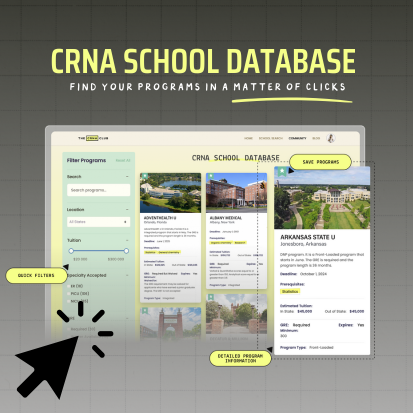
Hey, I’m Sachi, founder of The CRNA Club. It’s my mission to educate and empower you to accomplish your dream of becoming a CRNA. Today’s post is going to have a smidge of tough love, but keep reading till the end, I PROMISE you’ll learn something.
If you’re a registered nurse thinking about becoming a CRNA, you’re probably wondering, “Do I have what it takes to get in?” You’re not alone.
The application process and getting into CRNA school is extremely competitive, and acceptance rates vary from program to program (as well as class size) but most are around the 15-25% range. Class sizes can range from 10 students to 40. Most programs have around 20-30 students per cohort. It takes a great deal of focus, passion, and dedication to get into CRNA school, and the journey can be daunting at times, but it is also extremely rewarding and fulfilling.
Yes, it’s competitive, but let’s discuss how you can stand out amongst the crowd and get your acceptance letter so you can put those 4 sweet letters behind your name – CRNA.
How Competitive Is CRNA School?
There are over 120 accredited anesthesia programs in the United States. We’ve got a comprehensive CRNA School Database that you can easily filther through programs (yep, we’ve done the hours of searching for you).
Each program has nuances in their requirements, however, generally they all require similar skills and critical care experience. Most require at least 1 year of adult ICU experience (some accept ER, NICU, or PICU), a minimum 3.0 GPA, as well as basic certifications, CRNA shadow experience, and recent science classes.
The most competitive programs tend to be the ones with the more affordable tuition rates, and the best reputations for producing prepared and experienced graduates. For example, Kaiser Permanente School of Anesthesia has traditionally been one of the top programs in the US, with a lower tuition under $100,000, but very competitive with over 300 applicants and an acceptance rate around 15%.
CRNA School Application Requirements
Critical Care Experience
Application requirements include critical care experience because nurse anesthetists need to have a deep understanding of pharmacology and pathophysiology. ICU experience exposes nurses to critically ill patients, dependent on life-saving measures such as mechanical ventilation, CRRT, and vasoactive drips. Level 1 or Level 2 Trauma centers and large teaching facilities are favorable to small, community hospitals where the acuity might be lower.
CRNA School Prerequisites
Some schools will require specific science classes to be taken within the last 5 years, like Georgetown who requires statistics and chemistry. Each school will have their own pre-requisite requirements, so be sure to check out each school well in advance so you have time to take the classes required (and get As!).
The most common prerequisites required are: chemistry, physiology, statistics, pharmacology and microbiology.
GRE
Most schools do not require GRE scores, although quite a few do if your GPA is less than 3.5. If the program you are applying to does not require the GRE, it may be advantageous to take it (permitting you give yourself enough time to study and score at least a 305, and 4.0 on the writing section) if you have a lower GPA (less than 3.5). Given that programs are so competitive, you need to be able to show the admissions committee that you are able to study and perform academically, reflecting your ability to handle graduate level curriculum.
CCRN Certification
CCRN certification is not technically required for all schools, however, we consider it an unspoken requirement. Given that programs are so competitive, programs will wonder why you haven’t taken it. Truly, the expectation is that you obtain your CCRN and additional certifications in your specialty.
GPA
The minimum GPA requirement for programs is 3.0 to 3.2. However, to be competitive you really should have a GPA of 3.5 and above. For accepted applicants, 3.6 is about average. If your GPA is lower than 3.5, you really should consider taking a graduate-level science course to show the program that you can handle a rigorous curriculum.
What if my GPA is lower than 3.5? You’re not alone! If your GPA is lower than 3.5 you still have a great chance of getting into CRNA school with the right strategy. You’ll need to take extra certifications, possibly a graduate-level course, and hold leadership positions on your unit or even hospital-wide.
ICU Experience
Adult ICU experience is best, however, more and more programs are accepting NICU and PICU experience. There are a handful of programs that accept ER or OR experience, however, you really need to be very competitive in all other areas of your application (GPA, leadership experience, certifications etc). Adult ICU experience is favorable because you are exposed to a wide range of pathophysiological disease states, vasoactive drips, and invasive monitoring that you might not be exposed to in the pediatric or neonatal population.
Leadership
To be a competitive CRNA school applicant, you need to have leadership experience. While charge nurse and precepting is great, programs really prefer to see leadership on a unit committee or even a hospital-wide task force. You really need to show that you are a go-getter, achiever, and leader amongst your peers. Along with leadership, community involvement and volunteering is a must as well.
Overall, nurse anesthesia programs are highly competitive and require strategy and careful planning to gain acceptance. Programs want well-rounded applicants with a high emotional intelligence, and an ability to handle a stressful curriculum and academic rigor. Although the path to becoming a CRNA is challenging and difficult, nurse anesthetists are one of the most respected in the nursing field, and enjoy a high degree of autonomy.
Resources to help you become a stand out applicant
If you're applying to CRNA school, check out our community of aspiring CRNAs - The CRNA Club Membership. We've got a comprehensive CRNA School Database, over 60+ bite-sized how-to video lessons, templates, study guides, and swipe files just for you!



